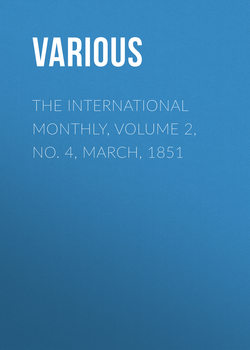Читать книгу The International Monthly, Volume 2, No. 4, March, 1851 - Various - Страница 5
A NOVELIST'S APPEAL FOR THE CANADAS
ОглавлениеAmong the new English novels is one entitled Ellen Clayton, or the Nomades of the West, by Douglass Huyghue. The author seems to feel for the red men the same regard which the adventurous artist and traveller Catlin has expressed in England, and his work comes in aid of those appeals which Catlin has so often made on their behalf. Such a motive entitles the author to respect, and gives an additional value to the book; while the talent with which it is written, renders it a narrative of unusual interest. In nothing but its theme is it like to any of Cooper's novels. Its incidents and its characters are not similar, and they lack truthfulness quite as much as they lack similarity. We know something of Indian life; in our youth we saw much of it; and we regard Cooper as its faithfulest delineator in literary art. The time at which this romance opens is in the year 1600, when the wars between France and England led to hostilities in Canada, and when an abortive attack was made upon Quebec by the British and colonial army. The hero and heroine are victims to the disasters of that war, and in describing their adventures, Canada, and the condition of its civilized as well as of its wild inhabitants, are vividly presented. The incidents justify the author in making this appeal to his English readers when he reminds them of the associations that should ever be connected with the fortress of Quebec:—
"Men of England, look not coldly upon the interests of that land for the possession of which your fathers fought and bled. Quench not irretrievably the flame of loyalty which burns in many an earnest heart, loath to contract these new ties which the progress of an irresistible destiny would seem to favor, at the sacrifice of affection for the fatherland. The blood of the greatest and wisest nation since the days of the Romans, flows in the veins of the Anglo-Americans, unadulterated by the air of another hemisphere, and stimulated into vigorous action by a necessity for continual exertion, combined with an entire liberty of thought which calls into play every resource of the physical and intellectual man. The sturdy and intelligent race that treads the virgin soil of Canada, can surely claim equality, at the very least, with the denizens of older Europe; cramped as they are for want of room, and enervated by an ultra-civilization that wrongs nature, and has almost taken the sceptre from her hand to put it into that of art. The British colonist enjoys a peculiar exemption from those prejudices, which, for so many ages, have retarded progress, and are successively being overcome by the convictions of a more enlightened era. There is a voice in the woods and mountains of a great solitude that elevates the soul and fortifies it with courage in the time of need. The great torrents and inland seas of that noble country have schooled the generation, nurtured by their side, into a strong conception of freedom, and the right to be justly dealt with, at the hands of those with whom it is connected by the double alliance of kindred predilection. A pernicious, temporizing policy has of late caused such wounds as may not be healed up very easily, we fear. The upright colonist has seen an unprincipled faction permitted to ride triumphant over those whose intentions are honest, and whose loyalty is proven. Let us hope, that ere long something of the chivalrous generosity of other days will pervade the councils of the state, and rouse the stalwart spirit of the Briton to scourge this ignominy from the land; if encouragement be due at all, it surely is to those true-hearted provincials who are avowedly proud of the great people from whence they derive their character, their language, and their laws—and who are as able, as they are willing, to preserve unto their beloved Sovereign the colony their sires won."
This is tolerably good rhetoric, but it is not likely to have much effect when the strong argument and imposing eloquence of statesmen have failed to arrest attention. We see notices of another political novel referring to Canada, which deals more directly, if with less talent, with the disabilities and wishes of the people. It is entitled, The Footsteps of Montcalm, and its hero, descended from a follower of the brave Frenchman, contrasts with his ideal of freedom and happiness, the laws, institutions, habits, and miseries, which he regards as inseparable from the colonial relation. As in the rebellion of 1838, whatever disaffection now prevails in British America, is probably shared much less largely by the English than by the French population. Political, religious, or sectarian novels, however, executed never so cleverly, are but sugared pills at which the appetite revolts as soon as the quality is discovered.
